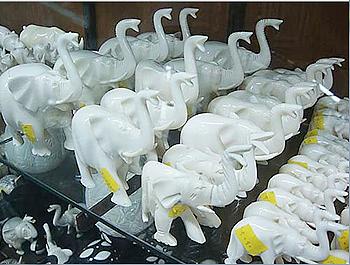Poachers kill hundreds of elephants in Cameroon
 0 Comment(s)
0 Comment(s) Print
Print E-mail China.org.cn, March 1, 2012
E-mail China.org.cn, March 1, 2012
Fourteen dead elephants were found in Bouba Ndjida National Park, Cameroon last week, slaughtered by poachers for their tusks, which were cut out of the carcasses.
![Elephant carcasses in Cameroon's Bouba Ndjida National Park. [File photo] Elephant carcasses in Cameroon's Bouba Ndjida National Park. [File photo]](http://images.china.cn/attachement/jpg/site1007/20120301/0014222d985010b94df822.jpg) |
|
Elephant carcasses in Cameroon's Bouba Ndjida National Park. [File photo] |
Shots were heard on February 20 in the Bouba Ndjida National Park in northern Cameroon, near the border with Chad. The 14 elephant carcasses were discovered two days later.
John Scanlon, secretary-general of the Convention on International Trade in Endangered Species, CITES, Tuesday expressed "grave concern" over the recent poaching of close to 450 elephants in Bouba Ndjida National Park in northern Cameroon.
He said the CITES program for monitoring the illegal killing of elephants shows increased levels of poaching in 2011.
"This spike in elephant poaching is of grave concern not only to Cameroon, a member state of CITES, but to all 38 range states of the African elephant, as well as the Secretariat," said Scanlon.
 |
|
In March and April 2011, investigators found more than 8,300 ivory items illegally available for sale in Cairo, Egypt. ? |
"This most recent incident of poaching elephants is on a massive scale but it reflects a new trend we are detecting across many range states, where well-armed poachers with sophisticated weapons decimate elephant populations, often with impunity," warned Scanlon.
He said governments of the region are being offered support to find and bring to justice those responsible and to locate and seize the poached ivory. He is urging potential transit and final destination countries to "remain extremely vigilant and to cooperate."
The latest dead elephants were found just a week after the discovery of at least 200 dead elephants in Cameroon, and more will be found in the coming weeks as gunshots continue to be heard, said Jason Bell, director of International Fund for Animal Welfare's Elephant Programme.?





